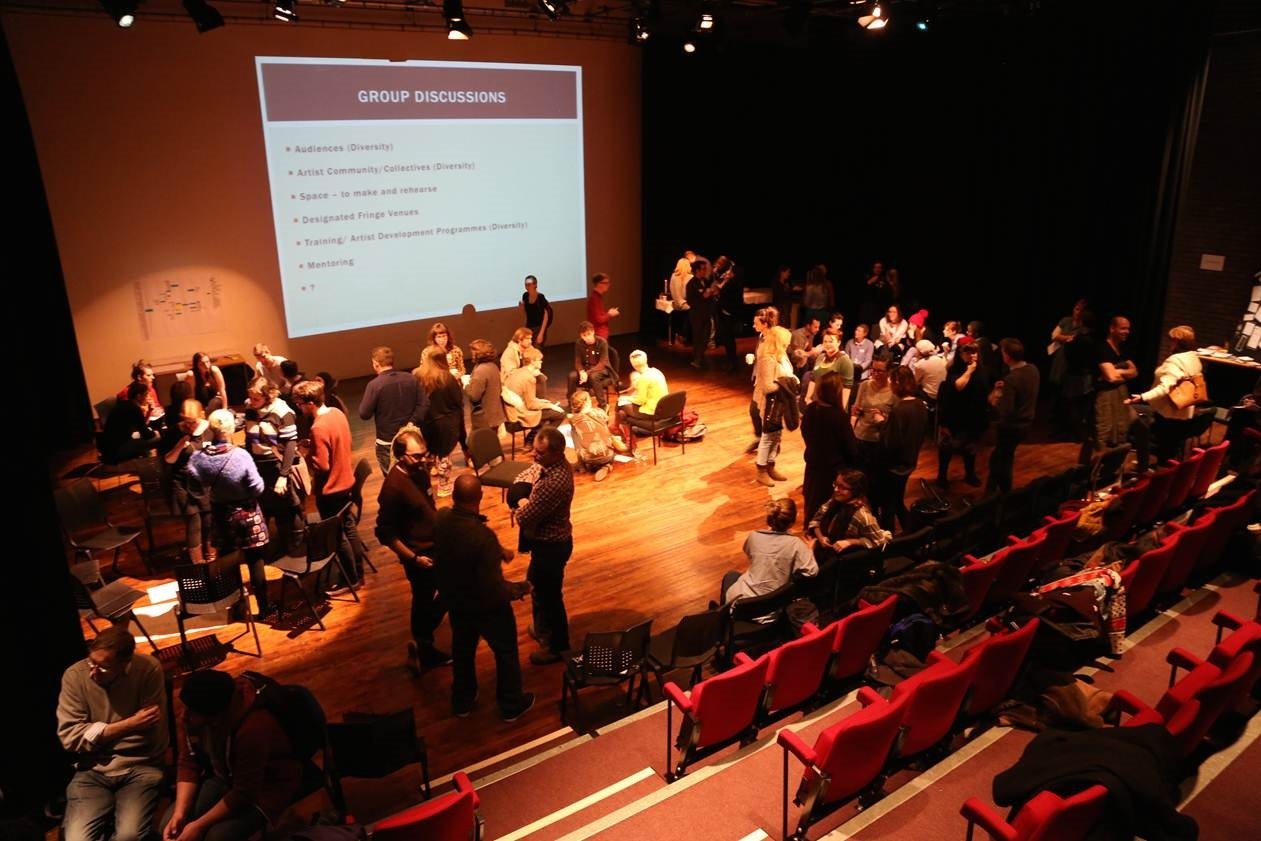
The symposium attracted theatre-makers and artists, producers, funders, students and academics
Fringe requirements
Amy Golding and Kay Hepplewhite report on recent research to find out what a vibrant fringe theatre scene needs.
Fringe is the training ground for many theatre-makers, where they can develop and hone their skills. It’s also a place where people can take risks, try out ideas and be allowed to fail. It is usually presented in small venues, above pubs, in spaces in a city or at festivals. It is a form of theatre that generally has lower ticket prices and therefore is more accessible to audiences of non-typical theatre-goers.
We knew through conversations in the sector that there is a strong desire in Newcastle and Gateshead for more experimental work and for additional independent spaces to present this type of work. Historically, the fringe scene in the region has not been as prominent as other independent arts scenes, such as the visual arts scene. That is not to say it did not exist, but simply that it was not as joined-up or as visible as it could be. Newcastle and Gateshead are places with a real sense of regional pride, known in the 1980s for having a complex structure of community theatre, theatre in education and political cabaret. There were many small groups, artists and activists making work across the city and some of these have grown into internationally renowned theatre companies such as Live Theatre. So while the region has an established and thriving theatre scene, the rate of new independents coming through has not been quite as rapid.
We wanted to explore how to encourage the independent performance sector to bubble up and not allow things to simmer down
Things are changing. There is something bubbling under the surface in terms of a fringe scene, but there is definitely room for improvement. We wanted to explore how to encourage the independent performance sector to bubble up and not allow things to simmer down. There was a real and timely potential to cultivate and nurture a more thriving independent scene in the city. And that was the main driver for our research. While we have seen many graduates from Northumbria University launching successful theatre companies in the region (Curious Monkey being just one), we wanted to understand the infrastructure that was needed to encourage even more of this activity.
To conduct the research, we visited Leeds and Bristol to compare best practice and look at existing models that support independent theatre. A mapping exercise identified the factors that contributed to the fringe scene in each city. Twenty-eight non-building-based theatre companies were identified, as well as individual artists making theatre and performance work. The project looked at how people felt about the current fringe and independent performance sector and discussed what needed to happen to support its development.
The research brought together so many perspectives in a dialogical approach. This enabled the findings to be easily disseminated and allowed for a lively debate – even while the project was still underway. The partnerships that already existed between the university, independent artists, producers and larger theatre companies gave the research the potential to have a real and speedy legacy. In fact, a symposium held at Northumbria University part way through the project attracted over 100 theatre-makers and artists, producers, funders, students and academics. Since then, a number of spin-off initiatives have come to fruition, including Shoal, a newly formed collective of independent performance-makers and small companies across the region, which are central to an invigorated and joined-up theatre community.
The research found that a vibrant fringe/independent theatre scene needs a balance of many variables and highlighted the following five areas:
- training and artist development
- making work
- presenting work
- support
- advocacy.
Time and money were factors that were discussed in relation to these five areas. This included examples of younger artists having a number of zero-hour contract jobs to keep them afloat, which made it difficult for them to find the time to make work on the side. There were also discussions about competition and access to funding, including the emphasis on philanthropic giving as a result of cuts and the economic climate.
Many practical issues were seen to support a vibrant independent scene. The top factors identified by significant numbers of research participants included:
- an audience for fringe
- an artist community
- access to rehearsal and making space
- a designated fringe venue
- sharing of resources
- artist development programmes
- good university or college courses in the region
- knowledge and access to other funding.
As part of Northumbria’s academic and graduate community, we welcome the opportunity to continue our dialogues with practitioners about the future of theatre in the city. Part of the impact of the research was due to key players being available for dialogues in the same room. Vital conversations were facilitated around relevant training and opportunities for sharing good practices, making progress with new venues and use of space. There was evidence of real listening to critical observations and learning from previous initiatives and ventures.
Over the last year we have seen some really exciting and entrepreneurial new theatre ventures, such as Alphabetti Theatre, a new fringe venue in Newcastle’s city centre (the brainchild of Northumbria graduate Ali Pritchard). We believe that the activity that is ‘bubbling under’ will add to this emerging new scene introducing us to new work by new practitioners in new venues. And we look forward to seeing the continued impact of our research, particularly through the Shoal network.
Amy Golding is Artistic Director of Curious Monkey. Kay Hepplewhite is a Senior Lecturer at Northumbria University.
www.curiousmonkeytheatre.com
www.northumbria.ac.uk
The research was funded by the Arts and Humanities Research Council and the Clore Leadership Programme and carried out in partnership with Northumbria University. Edited interviews are available to view.
Join the Discussion
You must be logged in to post a comment.